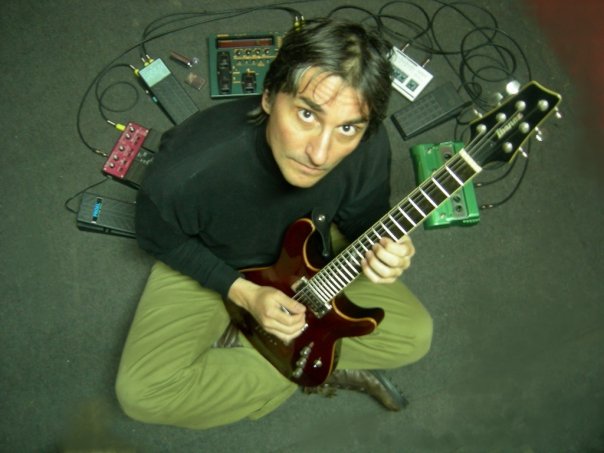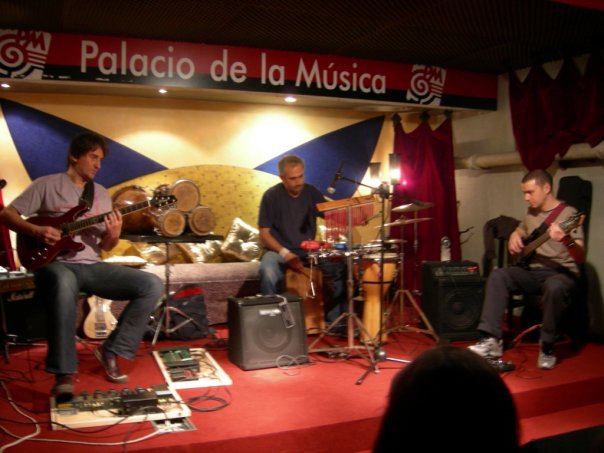(Hagan click aquí para leer esta nota en español)

Pablo Faragó
Born in Argentina, Pablo Faragó was to move to Uruguay in his late teens and form Níquel along with Jorge Nasser. The band made history in the country with its ability to mix styles and always retain a true River Plate sensibility, setting the scene for a younger generation of performers that sounded intrinsically autochthonous.
Níquel split as the 90s came to an end, but Pablo Faragó has continued making music to this day. I had the chance to talk with him about Mantras, his ongoing musical project – a project that is becoming 10 years old in 2011. What better time to ask him about his musical past, present and future?
We all remember you as one of the founding members of Níquel, a legendary band within Uruguayan music because it blazed a trail for a whole generation of younger performers to follow. Although you don’t make rock music any longer, you are still actively involved in the creation of music with your current project, Mantras. What can you tell us about it?
Mantras is a musical adventure that consists of electric guitar improvisations, using loop samplers that make for creating sonorous and rhythmical textures of different form and shape. The repertoire is always generated live, the music is created as I am playing. My music is nurtured by different trends and schools like minimalism, Afro-American rhythms and modern arts.
Which musicians are part of this project?
Mantras is basically a one-man show, but as the years went by I had the pleasure to be joined onstage by percussionist Fernando “Cacho” Rodríguez (who has played with Congo Bongo, Abuela Coca, Jorge Drexler and NTVG) and bassist José Ignacio Landoni.

Pablo Faragó, Cacho Rodríguez & Jose Ignacio Landoni.
What is the equipment that you use to create your Mantras?
Essentially, an electric guitar (which has changed over time – I currently use an Epiphone 335 Dot) and a lap steel. Their sound is processed using a pedal, and I have two machines for generating loops: a Boss RC-20 Loopstation, and a Line 6 DL6. A small console is used for mixing everything and sending the sound (in mono) to my amp, which is either a Valvular Peavey Deuce or a Crate 80 Solid.
I understand you have also worked as a producer. Which artists have you worked with, or are you currently working with?
It might sound strange, but my work in the field of music production takes place in classrooms. I have been teaching music production at the Instituto MEC in Montevideo. It is a workshop in which all the parts of the process (preproduction, recording and postproduction) are covered. The history of music is also part of the course, and we also discuss different work methodologies and the main software applications that are available. I do not work as a producer right now.
Most readers of this blog come from countries other than Uruguay. If you had to recommend an album by Níquel to them, which would it be?
I would advice them to get a compilation with the better-known songs (IE, the hits), plus these studio sides that make the cut. Gargoland is being reissued soon – that has some of our best songs.
What is your take on social networks? To which extent are they advantageous when it comes to communicating with the public, and in which sense are they counterproductive?
I use Facebook. I take social networks very calmly, I don’t worry too much about them because I don’t ask a lot of them.
In addition to visiting your MySpace profile, how can people who are interested in your current musical project get in touch with you?
For the time being, they can listen to my music on MySpace, and contact me personally via Facebook. Mi email address is pablo.farago@gmail.com.
This year I am releasing a CD celebrating the first 10 years of Mantras. I will let all your readers know when it is released, and whether it is distributed online or not.
Thanks a lot, Pablo!
You’re welcome!

Pingback: Pablo Faragó (Entrevista) | MusicKO